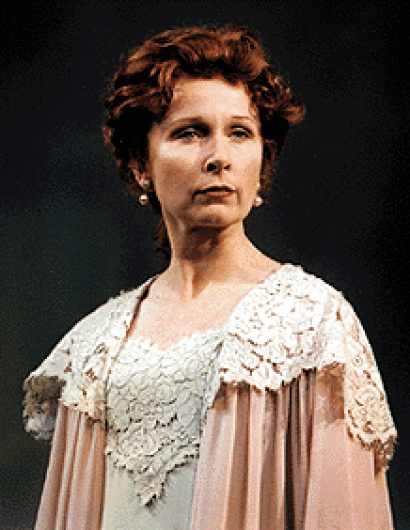
Plays in translation are bastard stepchildren of the originals, especially when the version presented is written by someone who cannot, and thus never has, read the original. I don't read Norwegian any more than Jon Robin Baitz does, but I have spent enough time in Norway, with Norwegian friends, and with direct translations of Ibsen plays, to know that Hedda is a peculiarly Norwegian type. (Buy me a drink and I'll tell you about the time, many years ago, when two local amazons abducted me off a railway bridge in Oslo, until they, both in their 20s, learned I was underage. It was early autumn, a time when headstrong Norwegian women sometimes go quite mad with dread at the approach of the long, dark, cold, boring winter.) Hedda Gabler, the play, takes place 100 years ago in, yes, early autumn, just as Hedda and her tedious academic husband, George, are returning from a six-month honeymoon abroad, back to Christiania (now Oslo), Norway, just as the leaves have withered.
Hedda -- a beautiful, charismatic, cruel, insecure, possibly alcoholic, almost certainly pregnant and deeply mentally ill woman, who fears she is just over the hill -- sees the start of the coming winter as tantamount to the end of her life. She has nothing to lose because all is lost, so what may have been previously unthinkable even to this monster of a bitch is now, well, not unthinkable. The play consists of the one-ring circus of her unraveling. The character, as always, is an enigma. She fires her father's pistol at her potential lover, Judge Brack, just for the hell of it, yet is so constrained by societal norms that she has married George Tesman. I assume she is easier to understand in Norwegian, but it is just a guess.
This production, which has had several incarnations over the last two years from L.A. to Williamstown, shows its double separation from the Norwegian original, but that is not necessarily a bad thing for an evening of theater. Ibsen has never been a favorite of mine, and Mr. Baitz confesses in a program note the same thing, adding that he has always preferred "the just-as-fierce vision of Anton Chekhov." Given the choice of trying, yet again, to render Ibsen's utterly Norwegian anti-heroine without the brooding, somewhat guttural language she thinks and speaks in, or translating the character herself into American English, Baitz, director Nicholas Martin, and Kate Burton have chosen the latter. For the most part, it works. During a time of difficult Broadway sales, they've found a way to pack audiences in for a classic. The Thursday night audience I was in followed the play every moment, laughed consistently at many of the very funny scenes before intermission, audibly gasped during some of the horrors after the break, and offered a huge ovation at the end. That's a successful performance.
It is unfair to compare Ms. Burton with her late, legendary father, Richard Burton, but it is appropriate, I believe, to mention that for the last 20 years, she has had an enormously admirable career that is quite free of the larger-than-life aspects of his. Whereas one could never miss his presence in anything, Kate Burton has long been able, like the best character actors, to shine in role after role without ever reminding one of anything she has appeared in previously. Nevertheless, because the name of the father still looms so large, the acting world has wondered whether the daughter would ever break through to become a true star herself. That, as much as what occurs onstage, is what has happened with this Hedda Gabler. Kate Burton dominates the stage with a Hedda quite unlike any in previous memory. She does not brood. Her insecurities, such as they are, only give her greater energy to recklessly gamble with the lives of those foolish enough to be in the same room with her. Her chemistry with other actors onstage is brilliant.
Harris Yulin, always fine but never before electric, sizzles with her Hedda, as his confidently well-mannered and utterly evil Judge Brack first sets her up then corners her. David Lansbury, who so often plays the passive-aggressive, here plays every emotion on the outside, as his Lovborg is first unfailingly polite to Hedda's husband, then ruthlessly seductive behind his back and ultimately, after intermission, the very incarnation of One Who Has Hit Bottom, with a perfectly clear intensity that matches the bloodstains all over his face and through the tears in his clothes. This Hedda is not just in the American Language, it is in the American idiom, and one of the most accessible, most enjoyable productions of an Ibsen play I've seen.
